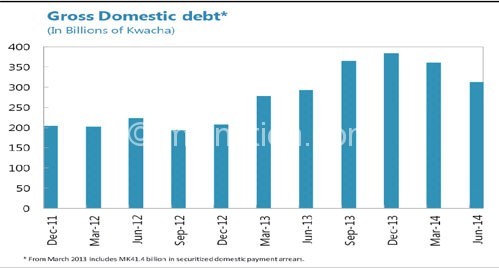Malawi to pay K93 billion interest

Malawi is projected to pay K93 billion (about $232m) in interest this year—15 percent of the budget—up from K31 billion (about $77m) reflecting high rates and domestic debt, the International Monetary Fund (IMF) has said.
The IMF in its February 2014 Malawi Country Report released last week has said that as the shortfall in donor disbursements is particularly acute in the second quarter—October to December—the authorities needed additional domestic borrowing to avoid a collapse in government services, including critical social expenditure.
Earlier, Treasury admitted that it over-borrowed domestically between July and September by about K59 billion (about $147m).
The private sector has since blamed government heavy borrowing from the domestic market, arguing it is driving interest rates up. Current lending rates are above 40 percent.
Reflecting the heavy borrowing, according to the 2013/2014 Budget Performance Quarterly Report released recently by the Ministry of Finance, government paid over K33.1 billion—about five percent of the national budget—in interest on debt between July and September 2013, way above the budgeted K8.2 billion. Government paid over K32 billion in domestic debt interest, about K25 billion over its budget.
The IMF has, however, said the recent cutback in donor inflows and the net impact of other revisions to the fiscal outlook result in a financing gap of K32 billion.
The fund has, however, proposed a combination of expenditure cuts and domestic financing to cover the gap while protecting social expenditure.
“The authorities have announced expenditure control measures that are expected to yield gross savings of about K31 billion. The measures involve stringent cuts to travel, postponement of domestically financed development projects, and savings from efficiency gains from the operation of Farm Input Subsidy Programme (Fisp),” reads the report in part.
According to the country report, government is expected to save about K11 billion from domestic travel, K4 billion from Fisp and K16 billion from domestically financed development expenditures.
And to cover the remaining financing gap, net domestic borrowing is proposed to be increased by K14 billion from the programmed repayment of K7 billion to borrowing K7 billion for the year as a whole.
But the 2013/14 budget statement noted that government fiscal policy would be anchored by no net domestic financing—that it would not incur more debt.
According to the budget statement, the fiscal stance was intended to reduce the domestic debt stock to allow the private sector space to borrow at reasonable rates for productive investment.






All the more reason we r callin on govt. to exercise financial prudence to minimise the strain on the tax-payer
We hope all civil servants will corporate with president Joyce Banda’s financial reforms. It will take a lot of commitment but I am hopeful government is doing possible to improve the situation